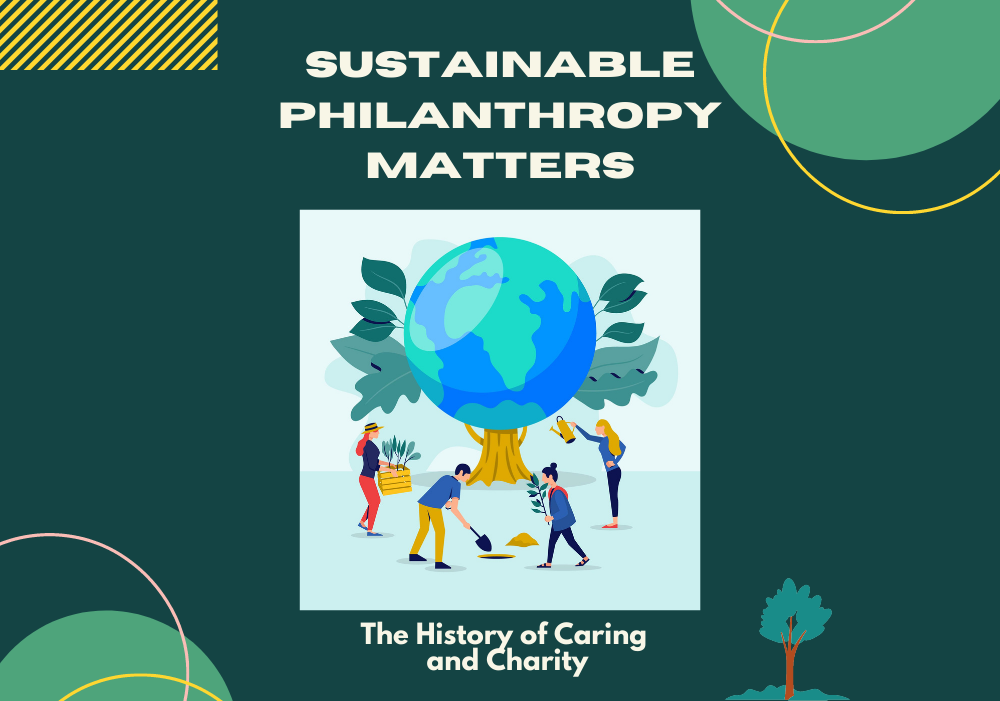Sustainable Philanthropy Matters: The History of Caring and Charity


In this three-part series ‘Sustainable Philanthropy Matters’, we explore the surprisingly intimate relationship between philanthropy and sustainability and how the practice of one can in fact, lead to the advancement of the other. Both of these issues are close to our hearts here at CFS and we want to share how our philanthropy can help preserve our planet, our communities and our future.
Believe it or not, philanthropy and sustainability are concepts that have been around for millennia. Our forefathers understood the need for charity and living with the future in mind long before we had frameworks and modern models for them.
Examining the Roots of Giving
Although the word philanthropy, or philanthropia as the ancient Greeks called it, first emerged about 7000 years ago, it meant a love for one’s fellow people, not so much the donation of drachmas.
In fact, it was not until about 5000 years later, as described in the Bible, that a form of community where those who shared what they had with those who had not really began. Although some may argue that this was communism, not charity; however, this was an early record of giving resources to help those in need. While the term sustainability seems like a pretty modern buzzword, elements of this actually existed 3,000 years ago. It was discovered that humans in the late Neolithic period had developed a method of sustainably obtaining their firewood, avoiding deforestation and ensuring they would always have a way to keep warm (Dufraisse, 2008, pp199-210).
This could be said to be the distant ancestor of the 1713 Principle of Saxony formulated by Hans Carl von Carlowitz. His forestry treatise discussed the “continuously enduring and sustainable use” of the forest for wood (World Ocean Review, 2015).
Philanthropy in the Present
Giving to others has continued to exist till today, expanding from religious origins to permeate many facets of society. Tithes still exist but now one can donate through the Government or via non-profit and voluntary welfare organisations. The range of beneficiaries has also expanded, with those in need ranging from children and people with disabilities to isolated seniors, ex-offenders and so much more. The underlying commonality is that they are almost always in financial need of some sort. And it is the act of giving a monetary donation to support these beneficiaries that is the philanthropy we have come to know today.
However, evidence of financial contributions towards the environment only came along in the middle of the 20th century. It began in 1941, to be exact, with Rockefeller funding conservation activities across the United States, amongst his numerous other philanthropic efforts (Rockefeller Brothers Fund, 2022). And it was only seven years after that that the International Union for Conservation of Nature—the oldest environmental organisation in the world, mind you—was only established on 5 October 1948.
The Purpose of Philanthropy and Planning Ahead
For those who give, whether to social or environmental causes, there is a variety of reasons as to why we do so: a sense of obligation, concern over a particular issue, a desire to see a better future and, yes, even tax relief. It is alright to be pragmatic!
However, giving towards social causes has a deep-seated, almost unconscious need to grow the community. From ancient times, we humans have understood the strength in numbers, which is why we formed communities, or tribes as they were called back then.
However, in banding together, there was an inevitable strain on resources. This created the need to be responsible for how we consumed our natural resources and, in a larger sense, be mindful of how our actions impacted the environment.
Charity + Conservation = Sustainability
Without the ever-present danger of a larger tribe taking over our own, or at least not in Singapore, there is little direct and personal benefit to us as a donor, apart from tax deduction and a sense of well-being.
We give simply because we care. That is the link between the two.
Whether it is towards social or environmental causes, community or green philanthropy, our contributions show that we care for others. It could be for the present, through financial assistance for daily living for instance, or for future generations, through conservation efforts. Because, after all, the children of our children will need a liveable world in which to grow up.
It can be a little daunting, given the sheer range of needs that society faces today, to consider also the needs of those who have not yet been born.
Leave a Legacy
Thankfully, the world (and its needs) does not rest on one’s shoulders alone. With years of experience in studying philanthropic trends and working to understand the needs of the community and environment, The Community Foundation of Singapore (CFS) can help you add your footprint to humankind’s long and ongoing journey of giving.
We value the creation of positive impact while keeping in mind the bigger picture of how the contribution will create sustained change.
At CFS, we steward our donors, through their funds, to make their mark on our community and our planet. Whether they contribute today or over the years, it will be their legacy. To find out how you can leave your legacy for tomorrow, please visit here.
To learn more about CFS’s Corporate Sustainability efforts, please read more here.
To read the other 2 stories in the ‘Sustainable Philanthropy Matters’ series, please click below:
This article was written by Adam, a Principal Consultant with CFS and an experienced sustainability practitioner. He is an advocate for sustainable practices. His colleagues are still wondering how his monthly household utilities bill is only around $70.
Disclaimer: The opinions expressed in this publication are those of the author. They do not purport to reflect the opinions or views of CFS or its members.
References
- Alexa Dufraisse. (2008). Firewood management and woodland exploitation during the late Neolithic at Lac de Chalain (Jura, France). Vegetation History and Archaeobotany 17(2).
- World Ocean Review 4. (2015). Sustainable Use of Our Oceans – Making Ideas Work. https://worldoceanreview.com/en/wor-4/concepts-for-a-better-world/what-is-sustainability/
- Rockefeller Brothers Fund. (Accessed 2022). Conservation and the Environment. https://www.rbf.org/about/about-us/conservation-and-environment
In this three-part series ‘Sustainable Philanthropy Matters’, we explore the surprisingly intimate relationship between philanthropy and sustainability and how the practice of one can in fact, lead to the advancement of the other. Both of these issues are close to our hearts here at CFS and we want to share how our philanthropy can help preserve our planet, our communities and our future.
Believe it or not, philanthropy and sustainability are concepts that have been around for millennia. Our forefathers understood the need for charity and living with the future in mind long before we had frameworks and modern models for them.
Examining the Roots of Giving
Although the word philanthropy, or philanthropia as the ancient Greeks called it, first emerged about 7000 years ago, it meant a love for one’s fellow people, not so much the donation of drachmas.
In fact, it was not until about 5000 years later, as described in the Bible, that a form of community where those who shared what they had with those who had not really began. Although some may argue that this was communism, not charity; however, this was an early record of giving resources to help those in need. While the term sustainability seems like a pretty modern buzzword, elements of this actually existed 3,000 years ago. It was discovered that humans in the late Neolithic period had developed a method of sustainably obtaining their firewood, avoiding deforestation and ensuring they would always have a way to keep warm (Dufraisse, 2008, pp199-210).
This could be said to be the distant ancestor of the 1713 Principle of Saxony formulated by Hans Carl von Carlowitz. His forestry treatise discussed the “continuously enduring and sustainable use” of the forest for wood (World Ocean Review, 2015).
Philanthropy in the Present
Giving to others has continued to exist till today, expanding from religious origins to permeate many facets of society. Tithes still exist but now one can donate through the Government or via non-profit and voluntary welfare organisations. The range of beneficiaries has also expanded, with those in need ranging from children and people with disabilities to isolated seniors, ex-offenders and so much more. The underlying commonality is that they are almost always in financial need of some sort. And it is the act of giving a monetary donation to support these beneficiaries that is the philanthropy we have come to know today.
However, evidence of financial contributions towards the environment only came along in the middle of the 20th century. It began in 1941, to be exact, with Rockefeller funding conservation activities across the United States, amongst his numerous other philanthropic efforts (Rockefeller Brothers Fund, 2022). And it was only seven years after that that the International Union for Conservation of Nature—the oldest environmental organisation in the world, mind you—was only established on 5 October 1948.
The Purpose of Philanthropy and Planning Ahead
For those who give, whether to social or environmental causes, there is a variety of reasons as to why we do so: a sense of obligation, concern over a particular issue, a desire to see a better future and, yes, even tax relief. It is alright to be pragmatic!
However, giving towards social causes has a deep-seated, almost unconscious need to grow the community. From ancient times, we humans have understood the strength in numbers, which is why we formed communities, or tribes as they were called back then.
However, in banding together, there was an inevitable strain on resources. This created the need to be responsible for how we consumed our natural resources and, in a larger sense, be mindful of how our actions impacted the environment.
Charity + Conservation = Sustainability
Without the ever-present danger of a larger tribe taking over our own, or at least not in Singapore, there is little direct and personal benefit to us as a donor, apart from tax deduction and a sense of well-being.
We give simply because we care. That is the link between the two.
Whether it is towards social or environmental causes, community or green philanthropy, our contributions show that we care for others. It could be for the present, through financial assistance for daily living for instance, or for future generations, through conservation efforts. Because, after all, the children of our children will need a liveable world in which to grow up.
It can be a little daunting, given the sheer range of needs that society faces today, to consider also the needs of those who have not yet been born.
Leave a Legacy
Thankfully, the world (and its needs) does not rest on one’s shoulders alone. With years of experience in studying philanthropic trends and working to understand the needs of the community and environment, The Community Foundation of Singapore (CFS) can help you add your footprint to humankind’s long and ongoing journey of giving.
We value the creation of positive impact while keeping in mind the bigger picture of how the contribution will create sustained change.
At CFS, we steward our donors, through their funds, to make their mark on our community and our planet. Whether they contribute today or over the years, it will be their legacy. To find out how you can leave your legacy for tomorrow, please visit here.
To learn more about CFS’s Corporate Sustainability efforts, please read more here.
To read the other 2 stories in the ‘Sustainable Philanthropy Matters’ series, please click below:
This article was written by Adam, a Principal Consultant with CFS and an experienced sustainability practitioner. He is an advocate for sustainable practices. His colleagues are still wondering how his monthly household utilities bill is only around $70.
Disclaimer: The opinions expressed in this publication are those of the author. They do not purport to reflect the opinions or views of CFS or its members.
References
- Alexa Dufraisse. (2008). Firewood management and woodland exploitation during the late Neolithic at Lac de Chalain (Jura, France). Vegetation History and Archaeobotany 17(2).
- World Ocean Review 4. (2015). Sustainable Use of Our Oceans – Making Ideas Work. https://worldoceanreview.com/en/wor-4/concepts-for-a-better-world/what-is-sustainability/
- Rockefeller Brothers Fund. (Accessed 2022). Conservation and the Environment. https://www.rbf.org/about/about-us/conservation-and-environment
- Related Topics For You: CHARITY STORIES, DONOR STORIES, DONOR-ADVISED FUND, ENVIRONMENT, LEGACY GIVING, OPINION, SUSTAINABILITY



